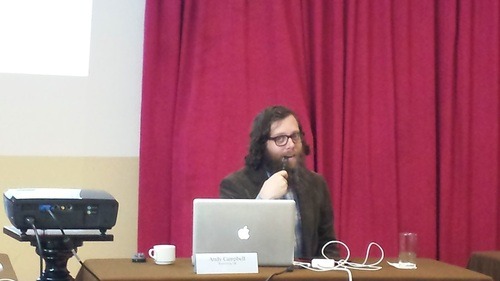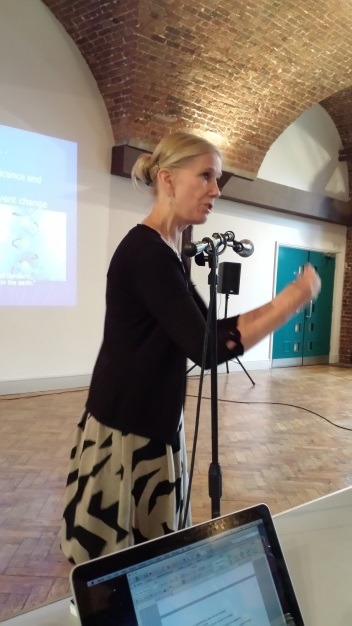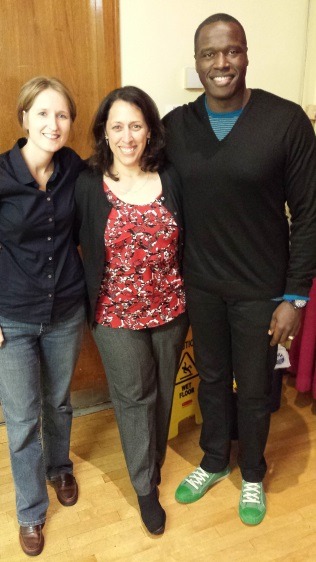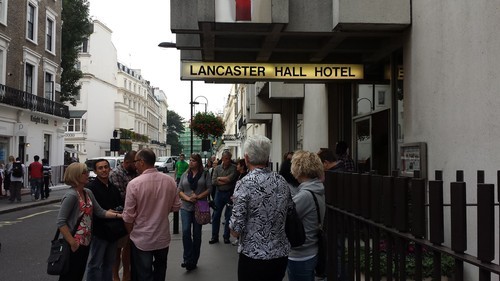London – A Space of Grace

Space…when I saw the name of this store in London it immediately caught my attention. It seemed that from the time I applied to the Doctor of Ministry in Leadership and Global Perspectives, space became my new word. Do I have the “space” to do this now? How do I make “space” for this in the midst of the other responsibilities I have in my hands? What kind of “space” will this take up in my life? How much emotional, spiritual, intellectual, and physical space will I need for this? What space do I need to give up or let go? What space am I being called to take up now? Is there space in my checkbook? Will there be space for me? Who will make space?
Space: noun, often attributive ˈspās
The Merriam-Webster[1]dictionary provides an assortment of definitions for the word “space.” Let me share a few of the definitions and how they were reflected before, during and after the “Advance” for me.
Space: a period of time. Can we all agree…it took a long time to get to London! For some of us it was less than 22 hours, for others it was way more than that. And yet for me it wasn’t hours…it was years. For several years I had been in a discernment process about doing my doctoral work. Yet in God’s perfect timing I am here! And I know that just as it took time for this journey to begin, it will also take time to do the work. I appreciated Jason’s ramp up tips: relax, trust the process, and learn the process. His encouragement and challenge to ask questions,…ask questions…ask questions…were both affirming and liberating. Jason provided a welcoming, open and safe space to ask questions among new friends and colleagues. What a great group of colleagues and fellow theologians! I am thankful for each one of you. The openness and hospitality of the mentors, professors, staff and guest speakers was top-notch! And thanks Jason for your last tip- “you all are already smart and capable to do this—-we believe in you!!” Amen! The space that our lead mentor continues to provide tells me that he wants us to succeed, to grow, to be challenged and to be the best leaders God has called each one of us to be.
Space: the opportunity to assert or experience one’s identity or needs freely.[2] Jason provided an excellent overview of the doctoral program. Here are my top three take a ways: (1) critical thinking (2) critical thinking (3) critical thinking. I think you get my point, at least I did! The last sentence in the Miniature Guide to Critical Thinking Concepts and Tools is one that has stayed engraved in my brain. “If we want critical societies we must create them.”[3] And this was and is an area where I continue to be challenged by. At the “Advance” each presenter, through their teaching, demonstrated that in order to create critical societies, we must become critical thinkers.

For example, Andy’s presentation on “Metaphor-What is It Good for-Absolutley Everything” was insightful and stimulating. He challenged me to think about metaphors and how we need to consider them when it comes to scripture. After the “Advance” I am more appreciative of how metaphors help me to see the lovliness and splendor of scripture by bringing them to life with imagery in our mind’s eyes. A picture is created or birthed from words. What a powerful way to look at scripture. He introduced me to Paul Ricoeur, whom I was not familiar with, but now am curious about. In addition, the space that Andy provided us with in walking us through the technology component of the program was priceless. 
MaryKate’s presentation on “Embodied Leadership and Power” reminded me that what we do is heard louder than what we say. In defining leaders and followers, Jay Lorsch contends that one obvious reason people follow leaders is because leaders have power or influence over them. He shares that the power may be positional and one of control over the person. [4] However, the power MaryKate presented is about an embodied leadership and power that offers the leader the ability to carry herself/himself in power and be the servant of all, not over all. She also challenged us to “think about leadership as more physical than mental, more relational than behavioral, more in Christ than about Christ.”
Space…an opportunity for privacy or time to oneself.
What kinds of superpowers would you want? What would you most desire? Wisdom, “that is rooted in listening is a profound spiritual attentiveness.”[5] Martin Percy’s presentation indeed invited us to make space with and for God. He asked questions that I continue to reflect upon on a daily basis. For example, “What do Leaders Need?” He shared that leaders need energy, vision, high levels of intelligence, compassion and wisdom. However, in the busyness of doing leadership, I can become preoccupied with the things that drain my energy, murky my vision, and hinder my critical thinking. There are times when I am more preoccupied with the tasks and things of ministry and I forget to be occupied with the One who called me. The making space to “slow down,” “not to be in a hurry,” and to “be prayerful and alert” were not new learnings for me. Yet, because of the space that Percy created, he challenged me to hear and see it in a new way. The call to leadership, Percy reminds us is a call to wisdom, it is a call to be occupied with God. As leaders we need to make space for private time with oneself and God.
Space – an interval of distance or time between two points, objects, or events.

The questions that continue to resonate with me and challenge me the most are the three questions that Martin Percy asked that “forms the heart and soul of what leadership may be about.” Between the “who” and the “what” of each of the questions, we need to take time and make the space to develop as leaders.
Perhaps, I need to start by asking who do I want to be? Or if I apply the Merlin Factor to these questions then I can say, who I am, and this is what I have done about it.
I am a leader who is intentional in creating critical thinkers in the area of theology. There seems to be an abundance of misconceptions, stereotypes, myths and false impressions about theology in the Christian community. Theology is not only for a few superior intellectuals, it is also for the Christian seeking to understand their faith.[6] As a pastor and leader, it is my responsibility and burden to create communities that are able to reflect in a theologically sound manner. Reflection involves a certain amount of critical thinking—questioning the ways we think and why we believe and behave the way we do.[7] Without this kind of reflection the Christian community runs the risk of interpreting and applying the scriptures in a wrong and often dangerous manner. Unreflective thinking creates unreflective faith which creates unreflective lives. Because of the space that I have taken in my own study and in reflective thinking I now can say that my community is one who is engaged in reflective thinking about their faith and how it connects in their daily lives. I am a leader who creates critical thinkers in the area of theology.
“What is the church and what are you going to do about it?” The church is a community of faith that is empowered by the Holy Spirit to live as witnesses and agents of God’s love, mercy and justice in the world. “…What does the Lord require of you, do act justly and to love mercy and to walk humbly with your God.”(Micah 6:8) As a leader who has created a reflective, critical thinking community, then the church is intentional in examining the areas of justice and mercy on a daily basis. How are we being fair and just in our dealings with people? What are the issues that are brewing in our neighborhoods? Where do we as a community of faith stand in solidarity with those who are disempowered and oppressed by the structures and institutions that “knock the socks” right out of them? Do we show mercy to those who wrong us? These are questions that move the church to be the feet and hands of Jesus among those who are in need of hope and in need of abundant life. Wherever poverty, hunger, greed war and injustices are found this is where the community of faith, the church, must say, “we are here!” For this is where Christ would be standing and is standing. The church has to take time to develop a good and solid understanding of who we are in relation to God in order to understand that we cannot do anything alone. How we live out our faith affects the lives of many people, locally and globally.
We are a reflective thinking community whose doings makes God’s presence and the values of the Kingdom (love, mercy, justice) real in the midst of our local and global community.

Why even bother with ministers and leaders and what are you going to do about it?” I have completed my D.Min. in Leadership and Global Perspectives—that’s what I’m going to do about it! Healthy leaders and ministers are those who take time to develop supportive friendships and hold each accountable.
Leadership is about creating and strengthening relationships, about building commitment…about adapting behavior to increase effectiveness…it’s about creating meaning…True leaders are merchants of hope, speaking to the collective imagination…, co-opting them to join you in a great adventure…Great leaders inspire people to move beyond personal…”[8]
If I truly care about leadership, then I also must make the space and time to care about other ministers and leaders. As leaders we can fall into the trap that we’re in this thing called leadership, alone. That is the farthest thing from the truth. Our overworked, overbooked, overcommitted lives of leadership can often create a sense of loneliness. Working on my D.Min. demands that I make space for study, reflection and thinking. This is in addition to the work of ministry that we are already doing. This is a reality. And this can take up a lot of emotional, physical and social space. However, we must transform our loneliness. When we practice an intentional belonging to each other and in the world, we experience a transformation from our loneliness into a more vibrant and peaceful sense of calling.[9] We need each other for support. We need to cheer out colleagues on to the finish line!
We can often become competitive in our leadership. There is nothing wrong with being competitive, but if it is the detriment of your sisters and brothers in leadership, then what are we as leaders modeling for those we lead? We/I must be mindful of praying for my colleagues who are swimming and sometimes floating in the waters of leadership. Why do I bother with ministers and leaders because God has also called them and we are called to also be in community with each one another.
Space…an area that is used or available for a specific purpose.

The Lancaster Hall Hotel became a space not just for sleeping, but a space for building relationships, learning, and worshipping. The rooms sleeping quarters were small, but that did not matter, because the spirit of community was enormous! The space that was created for meaningful interactions for both “co-horts” was a blessing. Our chats after the Advance were very different. We can “hear” and “see” each other now! Every Monday mornings, I feel like if we are entering into “sacred space” when we enter the chat room. Of course, some of us need at least two cups of coffee to have this experience! We have made safe space for each other.
The “Advance” in London became a space of grace for me.
[1]. http://www.merriam-webster.com/dictionary/space# (Accessed, December 21, 2013)
[3]. Richard Paul and Linda Elder, The Miniature Guide to Critical Thinking Concepts and Tools, (Tomales, CA: Foundation for Critical Thinking, 2009), 23.
[4]. Jay Lorsch, “A Contingency Theory of Leadership” in “Handbook of Leadership Theory and Practice,” (Boston, MA: Harvard Business Press, 2010), 417.
[5]. Mercy Percy, DMin Advance, London, England, 2013.
[6]. Stanley J.Grenz and Roger E.Olson, Who Needs Theology: An Invitation to the Study of God, (Downers Grove, IL: InterVarsity Press, 1996), 24.
[8]. Manfred Kets de Vries and Elisabet Engallau, “A Clinical Approach to the Dynamics of Leadership and Executive Transformation,” in Handbook of Leadership Theory and Practice, eds. Nitin Nohria and Rakesh Khurana, (Boston, MA: Harvard Business Press, 2010),192.
[9]. Robert A. Fryling, The Leadership Ellipse, (Downers Grove, IL: InverVarsity Press, 2010), 132.
Leave a Reply
You must be logged in to post a comment.